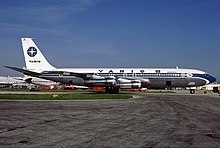Varig Flight 967
 A Varig Boeing 707-379C similar to the one involved in the accident | |
| Incident | |
|---|---|
| Date | 30 January 1979 |
| Summary | Disappearance |
| Site | Pacific Ocean, 200 km (110 nmi; 120 mi) ENE of Tokyo, Japan |
| Aircraft | |
| Aircraft type | Boeing 707-323C |
| Operator | Varig |
| Registration | PP-VLU |
| Flight origin | Narita International Airport (NRT/RJAA), Tokyo, Japan |
| Stopover | Los Angeles International Airport (LAX/KLAX), Los Angeles, United States |
| Destination | Rio de Janeiro-Galeão International Airport (GIG/SBGL), Rio de Janeiro, Brazil |
| Passengers | 0 |
| Crew | 6 |
| Fatalities | 6 |
| Survivors | 0 |
The 1979 Varig Boeing 707-323C disappearance occurred on 30 January 1979 when a Boeing 707-323C cargo aircraft of Varig Brazilian Airlines disappeared en route from Narita International Airport, in Tokyo, to Galeão International Airport, in Rio de Janeiro, with a stopover in Los Angeles International Airport. Neither the aircraft nor the six crew members have been found.
Background
Aircraft
The aircraft involved was a Boeing 707-323C, construction number 19235, line number 519,[1] delivered new to American Airlines under registration N7562A on 31 August 1966,[2] and sold to Varig and delivered as PP-VLU on 28 March 1974.[1] The jet was powered by four Pratt & Whitney JT3D-3B engines.[3]
Flight crew
Captain Gilberto Araújo da Silva, 56, First Officer Erni Peixoto Mylius, 45, Second Officers Antonio Brasileiro da Silva Neto, 39, and Evan Braga Saunders, 37, and Flight Engineers José Severino Gusmão de Araújo, 42, and Nicola Exposito, 40, were the members of flight crew.[4]
In 1973, Captain Araújo da Silva was in charge of flight RG 820, a Boeing 707 carrying 134 people which crash-landed near Orly Airport, in Paris, with 123 fatalities.[5] In 1979, at the time of disappearance, he had more than 23,000 hours logged.[4]
Accident
On 30 January 1979, the Boeing 707-323C registered PP-VLU disappeared en route from Narita International Airport to Rio de Janeiro-Galeão International Airport. The cargo aircraft, operated by Varig, lost radio contact 30 minutes after takeoff, approximately 200 km ENE of Tokyo.[6]
Notably, the cargo included 153 paintings by Manabu Mabe, returning from a Tokyo exhibition, valued at US$1.24 million. Neither the wreck nor the paintings were ever found.[6]
The cause of the incident was concluded as cabin depressurization, which killed the crew.[7]
See also
Similar incidents
- Hawaii Clipper
- BSAA Star Tiger disappearance and BSAA Star Ariel disappearance
- 1948 Airborne Transport DC-3 (DST) disappearance
- 1951 Canadian Pacific Air Lines Douglas DC-4 disappearance
- 1953 Skyways Avro York disappearance
- Flying Tiger Line Flight 739
- Malaysia Airlines Flight 370
References
- ^ a b "Aircraft construction & line number". airframes.org. Retrieved 27 December 2013.
- ^ "Aircraft data". airframes.org. Retrieved 27 December 2013.
- ^ "Background description of the Boeing 707 family". boeing.com. Archived from the original on 6 October 2013. Retrieved 27 December 2013.
{{cite web}}: Unknown parameter|deadurl=ignored (|url-status=suggested) (help) - ^ a b "Especial Gilberto Araújo: Nascido para voar". gilbertoaraujodasilva.sertaopb.com (in Portuguese). Archived from the original on 27 December 2013. Retrieved 27 December 2013.
{{cite web}}: Unknown parameter|deadurl=ignored (|url-status=suggested) (help) - ^ "Flight RG 820 accident description". aviation-safety.net. Archived from the original on 11 July 2013. Retrieved 27 December 2013.
{{cite web}}: Unknown parameter|deadurl=ignored (|url-status=suggested) (help) - ^ a b "Accident description". aviation-safety.net. Archived from the original on 11 July 2013. Retrieved 15 July 2013.
{{cite web}}: Unknown parameter|deadurl=ignored (|url-status=suggested) (help) - ^ "Em 1979, aeronave pilotada pelo brasileiro Gilberto Araújo da Silva sumiu entre Tóquio e Los Angeles". globo.com (in Portuguese). 6 June 2009.
